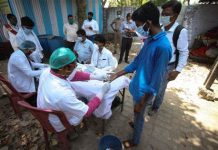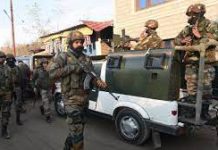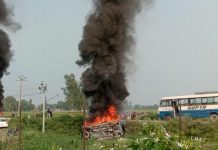 The ongoing talks for peace in the strife-torn Afghanistan have begun on a serious note, but the participants are reluctant to share the details of these crucial negotiations. Amidst these peace efforts, the Afghan Taliban, who had successfully ousted the Russian forces, then under the Union of Soviet Socialist Republic (USSR) following a 10-year fierce war ending in February 1989. In this Afghan war, more than 15,000 Russians had died and a large number of the soldiers were maimed. It forced the Russians to sign an accord with the USA and Pakistan to retreat its forces. The history appears to have taken a u-turn with the Afghan Taliban, who were once considered an arch enemy of Russians, now have agreed to be on negotiating table that too in Moscow. The world is also witnessing their prolonged intimate ties with the USA and Pakistan too is undergoing change. The Afghan Taliban want the troops of the USA and its allies must vacate Afghanistan before the new structure of government in Kabul could be finalised with the present regime.
The ongoing talks for peace in the strife-torn Afghanistan have begun on a serious note, but the participants are reluctant to share the details of these crucial negotiations. Amidst these peace efforts, the Afghan Taliban, who had successfully ousted the Russian forces, then under the Union of Soviet Socialist Republic (USSR) following a 10-year fierce war ending in February 1989. In this Afghan war, more than 15,000 Russians had died and a large number of the soldiers were maimed. It forced the Russians to sign an accord with the USA and Pakistan to retreat its forces. The history appears to have taken a u-turn with the Afghan Taliban, who were once considered an arch enemy of Russians, now have agreed to be on negotiating table that too in Moscow. The world is also witnessing their prolonged intimate ties with the USA and Pakistan too is undergoing change. The Afghan Taliban want the troops of the USA and its allies must vacate Afghanistan before the new structure of government in Kabul could be finalised with the present regime.
Amidst the reports of the realignment of forces in the strife-torn Afghanistan, it appears that there is a unanimity that peace must be ensured in this country. The sudden eruption of violence amidst the ongoing parliamentary polls in the country has caused widespread dismay. Some political observers suspect that a section of Taliban having pro-Russian sympathies is keen to assert their pre-eminence by indulging in this unwanted violence amidst these peace efforts. A report of the Special Inspector General for Afghanistan Reconstruction (SIGAR) released during May this year states that the Taliban control 56.3 per cent of the country. The ongoing violence during the first nine months of 2018, according to the United Nations Assistance Mission in Afghanistan (UNAMA), has already caused deaths to as many as eight thousand or more civilians, of them more than half were victims of suicide attacks.
The earlier efforts for initiating peace talks with the Taliban could be traced to 2007 when the USA allowed the Taliban to set up a diplomatic mission at Doha. They were allowed to set up an office, but they also put up their flag on the mission building, which was not acceptable to the Afghan government. In spite of many ups and downs, the Taliban continued to have an unofficial liaison with the Americans. The formal talks at official levels started only this year. Earlier, this year, the first round of the talks took place at Doha, when the US diplomats and the Taliban initiated direct talks. The Moscow conference under the Russian umbrella could be called a follow-up of the earlier efforts for peace. The Afghan-born US envoy, Zalmay Khalilzad, was not present in the Moscow negotiations, but his absence could not be called that the US is not endorsing the peace talks.
While the Doha talks were bilateral, the Moscow conference began which began on Friday, November 10, 2018, ensured a larger participation with the presence of 12 countries including representatives from Russia, Afghanistan, Iran, Kazakhstan, Kyrgyzstan, China, Pakistan, the US, Tajikistan, and Uzbekistan. India did not send any official delegation, but it was represented by its weather-beaten former diplomats, Amar Sinha, and TCA. Raghvan, former Ambassador to Afghanistan and High Commissioner to Pakistan respectively. Similarly, Kabul deployed its high-profile non-officials in the negotiations. It was represented by the High Power Peace Council, a government-appointed body responsible for reconciliation efforts with the Taliban, attended the event, where they repeated Afghan President Ashraf Ghani’s offer of peace talks without preconditions. The Taliban’s political office delegation led by Sher Abbas Stanekzai attended such international meeting for the first time. On the US side an official from its embassy in Moscow asserted that “no government, including Russia, can be a substitute for the Afghan government in direct negotiations with the Taliban. On behalf of the Taliban, it was stated that “they will be ready to speak with the Afghan government only after fixing a timetable for the withdrawal of all foreign troops from Afghanistan with the US.” They further stated, “As confidence-building measures under a preliminary plan, the Taliban demand that all political prisoners are freed and anti-Taliban sanctions, which were imposed back in 1997, be lifted.”
It is true that the Indian representatives, Sinha and Raghvan, did not make any observation, but the message was clear that India is ready to help in any peace process provided it is acceptable to all the concerned parties. During the past seven decades, India has been quietly suffering the Pakistani mischief of deploying the Pashtun irregulars as the Jihadis for attacking Kashmir in 1947-48. It was done on the orders of the UP-born Liaquat Ali Khan, the first Pakistani prime minister.
In 1973, another prime minister, Zulfikar Ali Bhutto had constituted a separate task force in the foreign office and also authorized military’s Frontier Corps under Brigadier (later major general) Nasirullah Babur to recruit Afghan Islamists like Burhanuddin Rabbani, Gulbuddin Hekmatyar, and Jalaluddin Haqqani to counter the secular Pashtun and Baloch politicians and separatists. It is also stated that Haqqanis were the darlings of the US and insinuated that Pakistan did it at the American behest. But the fact is that Pakistan sired those jihadists to counter the secular Pashtun leftists and nationalists and did so when neither Soviet troops nor the ISAF forces were in Afghanistan, which is produced as an excuse for jihad today.
While the West and Gulf Arabs had helped Pakistan’s jihadist project grow against the Soviet Union in Afghanistan, Pakistan never rolled it back even when this help and largesse stopped.
In this backdrop of events, India’s cautious approach in the Afghan negotiations must be understood. India, like most of Afghanistan’s neighbors and regional powers, has learned the hard way how to reach out to various warring parties in the country. The Taliban took over in 1996. India did not have enough access to the new regime to intervene when the Indian Airlines Flight 814 was hijacked and grounded in Kandahar in December 1999. However, during the past two decades, the Indian government has reasserted her historical and traditional ties with Afghanistan. The violence in Afghanistan has caused much worry to India, but her interest in the country’s peace was reasserted by the presence of two seasoned former diplomats. The challenge to usher in peace is much bigger than triggering off violence in Afghanistan. Indians know it.
letters@tehelka.com











